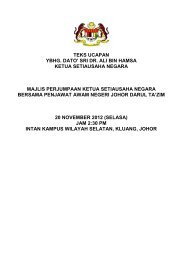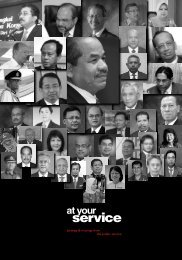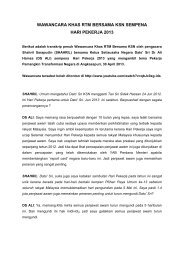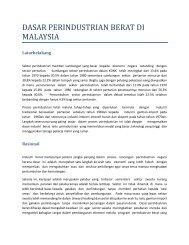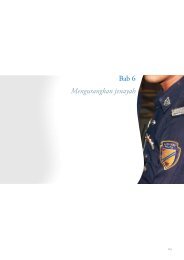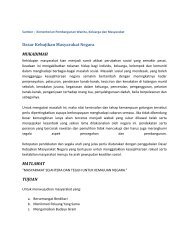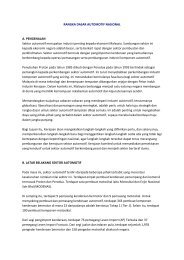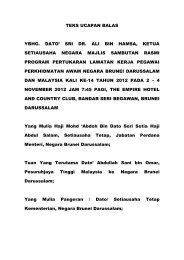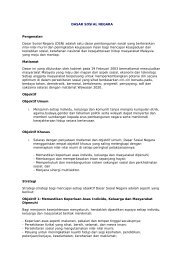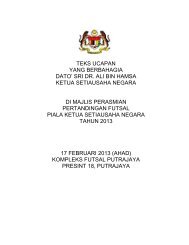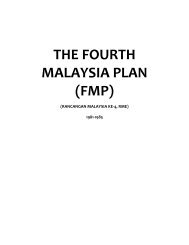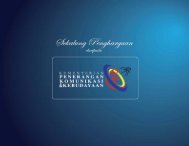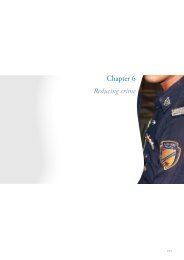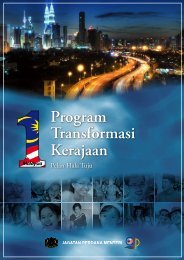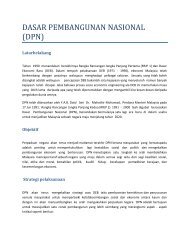GTP 2.0 - Prime Minister's Office of Malaysia
GTP 2.0 - Prime Minister's Office of Malaysia
GTP 2.0 - Prime Minister's Office of Malaysia
You also want an ePaper? Increase the reach of your titles
YUMPU automatically turns print PDFs into web optimized ePapers that Google loves.
5<br />
Financial literacy education will also be introduced in <strong>GTP</strong> <strong>2.0</strong><br />
as a key enabler to help low-income households make smart<br />
economic decisions, which is vital in helping them break<br />
free from the poverty trap. Financial literacy programmes<br />
will be integrated with the 1AZAM programme to ensure that<br />
participants make the best use <strong>of</strong> the training they receive.<br />
The goal is to integrate financial literacy for all 1AZAM<br />
participants and families as it will ensure a sustainable exit<br />
out <strong>of</strong> poverty. Under this initiative, the LIH NKRA will:<br />
Increase the awareness <strong>of</strong> financial literacy focusing on<br />
poor and extreme poor household needs<br />
Upscale and assist financial literacy training conducted by<br />
private sector and nongovernmental organizations<br />
Improve the quality <strong>of</strong> life <strong>of</strong> the poor by enhancing<br />
knowledge <strong>of</strong> household management<br />
Leveraging on Financial Literacy Education Training (FLET)<br />
programmes to enhance knowledge and decision-making<br />
Categorise eKasih graduate participants under exit policy.<br />
Finally, the <strong>GTP</strong> <strong>2.0</strong> will also see the enhancement <strong>of</strong><br />
supporting initiatives such as insurance schemes and shelters<br />
for the poor in <strong>Malaysia</strong> to provide better cover, especially for<br />
the urban poor. These supporting structures will ensure that<br />
there is a safety net in place for poor households should<br />
they need them.<br />
In order to achieve these objectives, the LIH NKRA will work<br />
more closely with the various ministries, corporate, NGOs<br />
and other relevant NKRAs such Improving Rural Basic<br />
Infrastructure (RBI NKRA), Improving Student Outcomes (EDU<br />
NKRA) and Improving Urban Public Transport (UPT NKRA). More<br />
details are available in the <strong>GTP</strong> Roadmap <strong>2.0</strong>.<br />
CREatING lINks IN a CoNtINuous<br />
PRoGRammE oF ChaNGE<br />
Ending poverty in <strong>Malaysia</strong> is an achievable goal. The measures undertaken in the<br />
last three years have put forward achievable demands that will have the capacity to<br />
effect change. While there will be key differences in the way the NKRA initiatives are<br />
implemented over the next three years, the measures, drawn from lessons learnt, will<br />
nonetheless be complementary. The goal for the next phase <strong>of</strong> change is broader<br />
engagement from corporate entities, NGOs and individuals.<br />
The LIH NKRA builds on a continuous programme <strong>of</strong> transformation and will thus<br />
see the major flagship initiatives <strong>of</strong> <strong>GTP</strong> 1.0 continued over the next three years with<br />
enhancements. Enablers will be added to support direct empowerment initiatives, and<br />
will in turn develop skills promoting healthy financial decisions.<br />
KEy lESSONS<br />
7.3<br />
Poverty eradication efforts must take a holistic<br />
approach, targeting long-term change and<br />
achieving lifestyle transformation. <strong>GTP</strong> <strong>2.0</strong><br />
will thus help cultivate the right environment<br />
to better enable the economic empowerment<br />
programmes implemented in <strong>GTP</strong> 1.0 through a<br />
number <strong>of</strong> tweaks such as the introduction <strong>of</strong> a<br />
mentoring programme and securing the aid <strong>of</strong><br />
NGOs in sharing expertise. Vulnerable groups<br />
will receive special attention in <strong>GTP</strong> <strong>2.0</strong>.<br />
One <strong>of</strong> the key challenges <strong>of</strong> <strong>GTP</strong> 1.0 was<br />
to encourage participation among the targeted<br />
recipients, who were reluctant to do so for a<br />
variety <strong>of</strong> reasons. These include a general<br />
resistance to change and also a lack <strong>of</strong> trust<br />
over the efficacy <strong>of</strong> the programmes. Some <strong>of</strong><br />
the participants preferred monetary assistance<br />
to training but most were concerned by the<br />
sustainability <strong>of</strong> the 1AZAM programmes. By<br />
marshalling NGOs to help with the delivery, the<br />
LIH NKRA believes that some <strong>of</strong> these issues may<br />
be overcome going forward.<br />
There were also cases where poor<br />
households registered with eKasih did not<br />
receive aid in a timely manner. The LIH NKRA<br />
Although the LIH NKRA started out distributing direct<br />
financial assistance to help low-income households, it<br />
quickly became obvious that this was not sustainable<br />
– neither for government nor for recipients. There<br />
was a need to empower recipients in order to create a<br />
long-term solution.<br />
believes that there needs to be greater<br />
streamlining <strong>of</strong> the delivery process to ensure<br />
that everyone who registers with eKasih will<br />
receive the support and assistance they need.<br />
The high cost <strong>of</strong> delivery services in remote<br />
Sabah and Sarawak was another great challenge.<br />
Hence, under <strong>GTP</strong> <strong>2.0</strong> the LIH NKRA effort<br />
in these two states will address community<br />
requirements while providing economic<br />
assistance via the 1AZAM programmes.<br />
As part <strong>of</strong> the lessons learnt in 2012, the LIH<br />
NKRA team has embarked on a number <strong>of</strong> pilot<br />
projects to strengthen the 1AZAM programme,<br />
namely initiatives concerning financial<br />
literacy, food baskets, community feeding and<br />
collaboration with NGOs. These new initiatives<br />
will require testing to identify any shortcomings<br />
before they are presented to their respective<br />
stakeholders for effective implementation.<br />
The LIH NKRA conducted a number<br />
<strong>of</strong> pilot programmes in 2012 for <strong>GTP</strong> <strong>2.0</strong><br />
initiatives to ascertain their viability before full<br />
implementation in 2013. These programmes<br />
include both economic empowerment and<br />
economic enablers. Examples are as follows:<br />
136 Government transformation Programme—Annual Report 2012 Chapter seven 137<br />
Government transformation Programme—Annual Report 2012 Chapter seven



